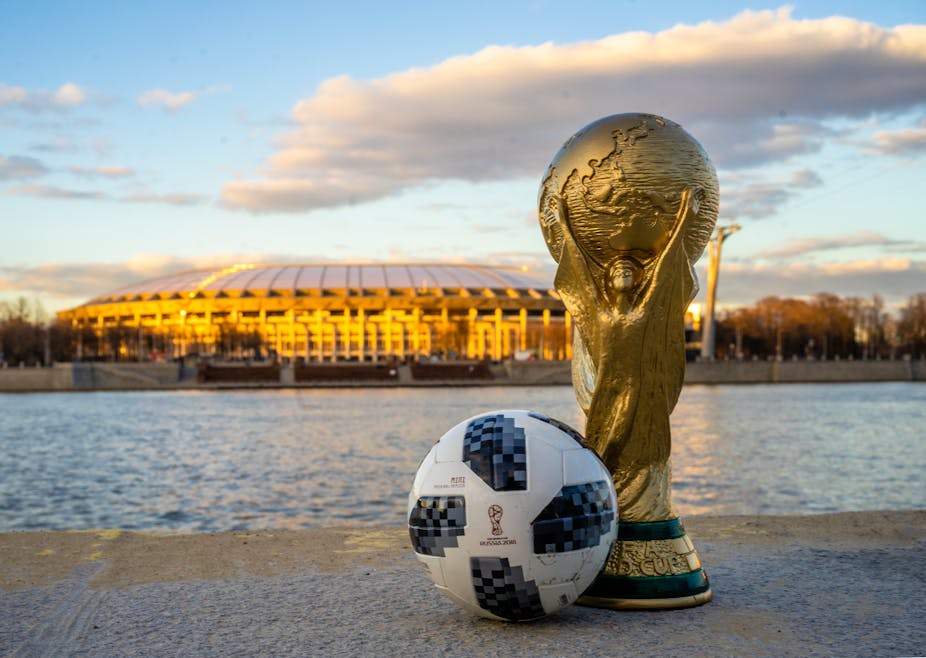Thankfully or regrettably, depending on your point of view, the 2018 World Cup has so far been something of a triumph for FIFA and the hosts, Russia.
The football itself has sparkled, dramatic upset has followed dramatic upset, and Video Assistant Refereeing has kept all the pundits, if not happy then at least busy. Russian supporters have shed their reputation as battle-hardened hooligans, and been embraced as consummate hosts even by the English fans, their sometime rivals. With England through to the semi-finals, football - whisper it quietly - could even be “coming home”.
But these successes have left one pre-tournament talking point out of the headlines. What about LGBT supporters - a demographic once nearly invisible in football stadia, who have now become, with the establishment of out and proud LGBT fan groups, almost as ubiquitous as the halftime pies?

To knowingly understate the situation, Russia is not considered a friendly environment for the LGBT community. Before the tournament, there were well documented reports that LGBT fans would be “hunted down and stabbed” if they dared display public signs of their sexuality.
Although Russia decriminalised gay sex in 1993, a new law was introduced in 2013 that banned “propaganda of non-traditional sexual relations”. Before we fall over ourselves to condemn, it is worth noting that the law bears a remarkable similarity to Britain’s own hated Section 28, which remained on the statute book from 1988 to 2003.
As in Britain during the homohysteria of the 1980s and 90s, LGBT hate crime in Russia has spiked substantially since the new law. The official advice from the Football Supporters Federation was that it would be “extremely unwise” to display any signs of LGBT sexuality, be it as simple as holding hands. Many LGBT supporters have stayed away - but not all. Joe White, a member of Arsenal LGBT fan group the Gay Gooners, has gone to the tournament in a specifically LGBT capacity.
Joe sees the World Cup partially as an opportunity to raise awareness. “[LGBT Russians] think it’s brilliant that we’re going out there,” he said before the tournament, “and that we’re going to be visible. A crucial part of our trip is to show solidarity and help however we can.” FIFA was “supportive”, White said, but he received emails and Facebook messages that weren’t. “If you don’t behave,” one read, “you might end up losing your head”.
A close contest
FIFA governs the World Cup, wherever it resides, and despite granting Russia the tournament, it has always claimed strictly to oppose homophobia. So, what is it doing about it?
Despite the death threats, Joe was determined to unveil a Rainbow Three Lions Pride flag at the group stage clash between England and Panama. His flag was initially confiscated by a steward, but FIFA intervened and it took pride of place behind one of the goals. Football 1 – Homophobia 0.

Earlier in the competition, reports surfaced that a St Petersburg “diversity house”, designed as a safe space for LGBT fans during the tournament, had been forced to close after objections from the landlord. A similar house in Moscow went ahead with full government support, but in St Petersburg intervention by FIFA failed to overturn the decision. Football 1 – Homophobia 1.
The next controversy came courtesy of the travelling fans from Mexico. Los Mexicanos have a longstanding tradition of serenading the opposition keeper with the word “puto” – a derogatory term for a male sex worker – every time he’d take a goal kick. Fines and reprimands from FIFA failed to stop the practice – but an appeal from Javier Hernandez’s Instagram appeared to do the trick. Perhaps unsurprisingly, the star striker known as “little pea” had more influence than all of FIFA’s suits put together, and their match against South Korea went off without any unpleasantness. Football 2 – Homophobia 1.
A rocky road ahead
Given these efforts, it would be nice to think that things are improving for LGBT fans. Perhaps they are, but there is no guarantee that gay rights in Russia will reap any long-term benefit when the FIFA circus rolls out of town. FIFA’s commitment to influencing its host country’s discrimination laws will be tested at the next World Cup in Qatar, where homosexuality is a criminal offence punishable by jail.

When Qatar was granted the World Cup in 2010, then-FIFA president, Sepp Blatter, was pressed on the subject, and assured listening journalists that “I think there shall not be any discrimination”. Moments earlier he had “joked” that LGBT supporters should “refrain from sexual activities”. In reality, we can but hope that FIFA uses its influence to promote equality in the desert nation – which would certainly not be possible without the tournament.
Social campaigns have so far struggled to make an impact on the Qatari authorities – evidence from the campaign to improve workers’ rights suggests that the battle will not be easy, but if FIFA really does commit to the cause then there is some hope for success. And with fans such as Joe White literally flying the flag for LGBT equality, there is more hope still.
More evidence-based articles about football and the World Cup:

